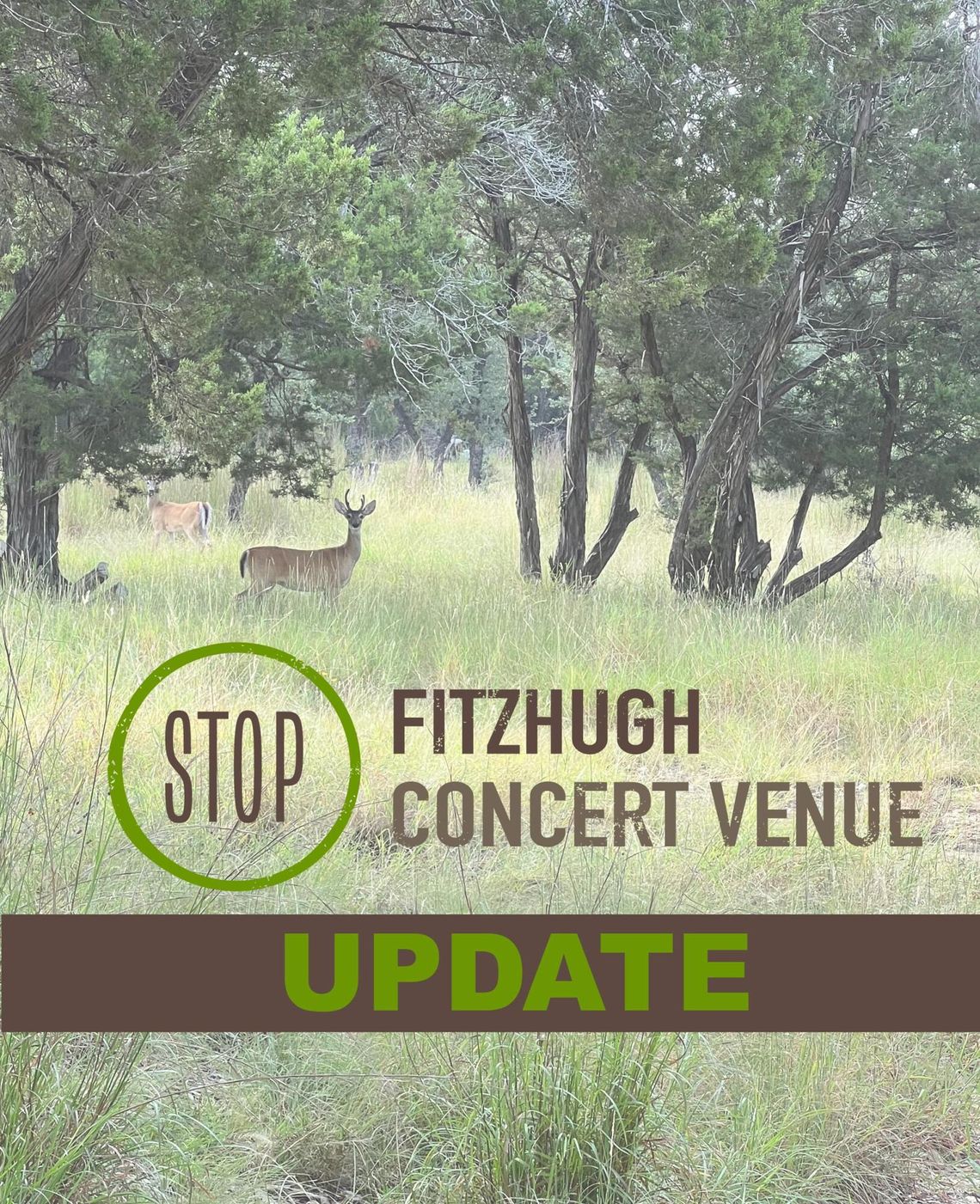A three-year battle to stop construction of a 5,000-seat outdoor concert venue on Fitzhugh Road appears to be near an end. On Nov. 19, community members and partner organizations announced that an agreement has been reached with the developer.
Fitzhugh Ridge, LLC, an entity established by the Shield-Ayres Foundation, has entered into a contract to purchase the 32-acre site from Blizexas LLC, ending the fight and ensuring protection for the sensitive area.
“In exploring all of the ways that we might be able to help bring about a resolution to this, we engaged in a discussion with the developer about the possibility of an acquisition,” said Marshall Bowen, vice president and general counsel of Shield Ranch. “As those conversations progressed, we ultimately came to a realization that this was something that both sides could live with and be happy about.”
The Shield-Ayres Foundation is a private family foundation created in 1977 by Robert M. Ayres, Jr. and Patricia Shield Ayres. The family owns Shield Ranch, which includes 6,400 acres on Barton Creek, adjacent to the site of the proposed concert venue.
Shield Ranch is one of the founding members of the Stop Fitzhugh Concert Venue coalition, which was formed in 2022 to oppose the proposed development. In addition, Shield Ranch is one of the parties involved in a contested case hearing with the Texas Commission on Environmental Quality (TCEQ) over the site’s proposed wastewater discharge permit.
“A number of community members, organizations and individuals formally participated in that permit process, which until this week was ongoing,” Bowen said.
Bowen said that the case is now on hold until Jan. 6, when the parties are expected to close on the sale. When that transaction is complete, the developer will withdraw the permit. Bowen said he was thankful for the work of the various neighbors and organizations who helped bring about this result through grassroots organizing, attending public meetings, writing to local news media and working with elected officials.
“I don’t know that we would’ve gotten to this position if it weren’t for the broader coalition and our fellow community members’ engagement on this. This was truly a community effort,” Bowen said. “I really believe that it was a combination of the multiple layers of community engagement… that really crystallized the message and ultimately helped us get to a resolution with the developer.”
The Stop Fitzhugh Concert Venue coalition was focused on multiple issues, but water quality was a key concern because of the topography of the area and the property’s proximity to Barton Creek.
“We had environmental concerns about potential contamination of Barton Creek because of the wastewater disposal process that the venue was pursuing,” Bowen said. “Then of course we had concerns about the sound and light pollution that would flow from an outdoor concert venue of this magnitude in a quiet country setting, and the effects that would have on people that call this area home and also the wildlife that live in this area.”
Bowen also said that traffic and road safety were a major concern.
“Fitzhugh Road is a dark, windy, two-lane road that is already dangerous with the current traffic,” Bowen said.
Bowen said that open spaces in the Hill Country are becoming increasingly scarce due to the growing metroplexes of Austin and San Antonio, and that these areas are critically important to the ecosystems and the wildlife habitats of the Hill Country.
“It’s not that we’re against any development in the Hill Country or even in this specific part of Hays County,” Bowen said. “It’s that we just don’t think this particular project is the right thing for this particular piece of land.”
The Shield-Ayres Foundation already supports environmental and outdoor education on Shield Ranch and focuses on protecting the land and water resources of the region, so Bowen said that owning this property is consistent with Shield-Ayres Foundation priorities. At this time, they don’t have particular plans for the site.
“But I can tell you that one thing’s for sure,” Bowen said. “This concert venue will not be built on the property.”
Bowen said there will be an increasing number of threats to the region as growth continues.
“People have to decide, what is the future of the Hill Country, and what kind of Hill Country do we want to leave our kids?” Bowen said. “There’s certainly room for growth and development. That’s going to be part of the story. But also part of the story - and this is what I’ve seen through this process - is a desire to keep some of this land protected for our wildlife, and for our water quality, and for our dark skies.”
Ultimately, those characteristics are what draw people to the Hill Country, Bowen said.
“I hope that out of this has come a renewed spirit among people in this area to protect our natural world,” Bowen said.
One of the obstacles with that is how regulation currently works in Texas.
“I think this project is a great case study in this. Here we had a piece of property in unincorporated Hays County that was outside the ETJ [extraterritorial jurisdiction] of any city, and so there was very little permitting that was required from a local government level,” Bowen said. “There was really no input from the county. There’s no avenue under Texas law to have the county weigh in formally or discourage certain development.”
Bowen said that issue has been getting some attention in the Texas Legislature.
“Last session, Senator [Donna] Campbell filed a bill that I really liked that would have given counties the ability to designate hydrologically sensitive areas in their county and then enact some zoning around those areas, with voter consent,” Bowen said. “I think proposals like that are really interesting, where we try to balance this idea of local control and free enterprise with the desire to have some oversight by counties in environmentally sensitive areas.”
Though that bill, SB 1954, did not pass, Bowen thinks Campbell is onto something.
“Other legislators hopefully will follow her lead in this and recognize that not letting counties have any say in what happens in their area can keep citizens from having a real ability to influence the future of their communities,” Bowen.
Bowen said this particular win is one that everyone can celebrate, and he thanked all the people and organizations that helped make it happen.
“We are grateful for the many community members who showed up, stayed informed, and stood together,” Bowen said. “This result demonstrates the power of collective action when our community is united in protecting the places we value.”
.png)









